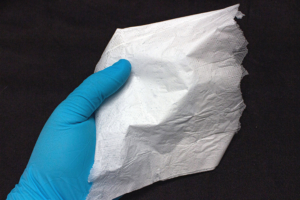Scientists test customized wound dressings made from tropoelastin
Customized, biomedically applicable materials based on tropoelastin are being developed in a joint project by Skinomics from Halle, Martin Luther University Halle-Wittenberg and the Fraunhofer Institute for Microstructure of Materials and Systems IMWS. The material combines biocompatibility, durability, biodegradability and favourable mechanical properties similar to those of skin. Preclinical tests have confirmed that it is suitable for use as a wound dressing material used in the treatment of chronic and complex wounds.
Particularly in the context of an ageing society, special wound dressings are gaining in importance. The treatment of complex wound diseases such as venous ulcers, leg ulcers, or foot ulcers is challenging for medical staff, long-term and painful for those affected and cost-intensive for the healthcare system. Innovative protein-based materials are now being used for the treatment of such wounds. However, since they are made from animal tissues, they carry increased risks of infection or can result in undesirable immune reactions. In addition, there are increasing reservations in the population about medical products of animal origin.
In the joint research project, the project partners are currently developing customized, biomedically applicable materials based on human tropoelastin. This precursor protein is converted in the body to elastin, a vital and long-lived structural biopolymer that has exceptional mechanical properties and thus gives the skin and other organs the elasticity and resilience they need to function.
“Elastin is chemically and enzymatically extremely stable, biocompatible and does not produce immunological rejections when used as a biomaterial in humans. Therefore, we want to create new and innovative solutions for the treatment of complex wounds based on human tropoelastin,” says Dr Christian Schmelzer, Head of the Department of Biological and Macromolecular Materials at Fraunhofer IMWS.
As part of the research project led by Prof. Dr. Markus Pietzsch of Martin Luther University Halle-Wittenberg, the researchers succeeded in developing a biotechnological process for modifying tropoelastin. The modified tropoelastin is processed at Fraunhofer IMWS. Here, an electrospinning procedure is used to produce ultra-thin nanofibers with diameters of only a few hundred nanometres. The resulting nonwovens are further crosslinked to stabilize them for the respective application. The procedures developed have been optimized so that biomedical parameters such as pore size, stability and mechanical properties are variable and can thus be customized to meet the requirements of the respective wound treatment. The materials produced using the new procedures are being investigated by Skinomics in initial preclinical tests with regard to their skin compatibility and have already achieved promising results.
At the end of the project by the end of this year, applications for intellectual property rights are to be filed, building the basis for a subsequent product development phase for certified medical products.


